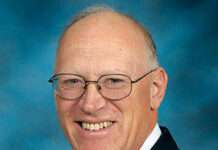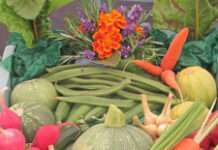Buying a live tree supports local economies, good for the environment
MANHATTAN, Kan. – During a year when many activities are limited or prohibited due to the COVID-19 pandemic, shopping for a Christmas tree is not one of them.
In fact, David Bruton – the utilization and marketing forester with the Kansas Forest Service – said he can think of no better holiday activity for families than to visit a local Christmas tree farm.
“The adventure and excitement of trying to find that ‘perfect’ Christmas tree, in the great outdoors, will no doubt create memories to last a lifetime,” Bruton said.
The Kansas Christmas Tree Growers Association lists 34 tree farms in its membership across the state. In 2015, the Kansas Department of Agriculture estimated more than 11,000 live Christmas trees were harvested and sold in Kansas.
The National Christmas Tree Association reports members in all 50 states, employing more than 100,000 people.
“Christmas trees, like all other trees, are natural, renewable resources,” Bruton said. “The members of the Kansas Christmas Tree Growers Association specifically plant and maintain their trees to be harvested and enjoyed as Christmas trees.”
Bruton noted that it typically takes between 6 to 8 years for Christmas trees to reach a height of six feet. Taller trees take about one year for each 14 to 16 inches beyond that, he said.
“Harvested trees are replaced each year with newly planted seedlings that are then grown and maintained for the enjoyment of future customers,” Bruton said.
Aside from providing a family’s thrill of finding just the right tree, Bruton said Christmas trees offer other benefits, including:
• One acre of Christmas trees provides enough oxygen for 18 people every day.
• Just one tree absorbs 1 ton of carbon dioxide during its lifetime. At any given time, more than 350 million trees are growing in the U.S.
• Used trees are recyclable. Nationally, there are approximately 4000 programs that recycle Christmas trees.
• Christmas trees are able to grow on soil that is unfit for other crops.
• During its lifetime, only ¼ of an ounce of pesticide is used on a non-organic tree.
Phil Wegman, president of the Kansas Christmas Tree Growers Association, encouraged consumers to get out and support the state’s farms, particularly in a year when the COVID-19 pandemic has created new challenges for their businesses.
He noted that the state’s farms have implemented steps to make the experience safe.
“Visiting your local tree farm gives families the opportunity to learn about growing trees and experience open spaces, fresh air, green space and natural beauty found in nature,” Wegman said.
Plus, he adds, “an investment in local Christmas tree farms is an investment in local communities. Christmas tree farmers re-invest income earned from selling their trees in other local businesses.”
More information on finding a Christmas tree farm in your area is available online.
FOR PRINT PUBLICATIONS: Links used in this story
Kansas Forest Service, www.kansasforests.org
Kansas Christmas Tree Growers Association, http://kctga.com
Kansas Christmas tree farms (map), http://kctga.com/kctga_website_temp_037.htm
National Christmas Tree Association, https://realchristmastrees.org
About the Kansas Forest Service
The Kansas Forest Service is the nation’s fifth oldest state forestry agency. The agency serves rural landowners, communities, rural fire districts, forest and arboriculture industries, and citizens of the state through its Conservation Tree and Shrub Planting, Fire Management, Community Forestry, Rural Forestry, Marketing and Utilization, and Forest Health programs. The Kansas Forest Service state office is located in Manhattan, Kansas, just west of the campus of Kansas State University. The Kansas Forest Service is housed as an independent agency within K-State Research and Extension. The agency receives its direction from a mission statement that reads: “Care of natural resources and service to people through forestry.”
About K-State Research and Extension
K State Research and Extension is a short name for the Kansas State University Agricultural Experiment Station and Cooperative Extension Service, a program designed to generate and distribute useful knowledge for the well being of Kansans. Supported by county, state, federal and private funds, the program has county extension offices, experiment fields, area extension offices and regional research centers statewide. Its headquarters is on the K State campus in Manhattan. For more information, visit www.ksre.ksu.edu. K-State Research and Extension is an equal opportunity provider and employer.
For more information:
David Bruton
785-945-6147
dbruton@ksu.edu
Written by:
Pat Melgares
785-532-1160
melgares@ksu.edu





